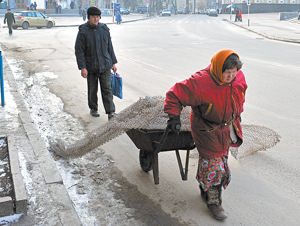Ukrainians to die for metal again?
Parliament registers a bill that cancels 15-percent export duty on scrap metal
The Party of Regions has come up with a new “reform”: they want to cancel the existing scrap metal handling regulations. On October 6 three MPs from the ruling party and one from the Lytvyn Bloc submitted a bill on making changes to Article 165 of the Tax Code, registered as
No. 9259. The document calls for canceling the taxation of individuals who collect and handle scrap me-tal. Yet the tax on scrap precious metal operations is to remain intact.
The bill authors say in the explanatory note that the existing 15-percent tax on scrap metal operations is overrated, which allegedly forces people to illegally handle scrap ferrous metals. The MPs are dreaming that the lifting of the tax will encourage the po-pulace to consign scrap metal to official outlets rather than to the dubious organizations that use this tax as security for their unlawful activities.
But the bill authors’ arguments look unconvincing. It is doubtful, for some reason, that they are deeply concerned about people’s interests or corruption control. In all probability, the introduced bill has a totally different aim: to ease state control over the profitable scrap metal business.
It is about a longtime dispute between steelmakers and scrap metal exporters, in which the former and the latter take turns to win. Steel mill owners would like the entire scrap me-tal collected in this country to be delivered to their enterprises, while scrap metal profiteers prefer to export it at higher prices to European Union me-tallurgical plants. Ukrainian scrap metal is highly valued in Europe owing to its relatively low price. The steelmakers so far have an advantage in the “scrap metal war” because scrap metal can only be consigned today to the outlets belonging to steel mills.
But Bill No. 9259 is openly lobbying the rights of scrap metal exporters because, if the bill is voted into law, they will be able to buy scrap in Ukraine at a 15-percent lower price and to derive as much larger profits from selling it abroad. For, in terms of cost-effectiveness, scrap metal business is almost on a par with arms trade or prostitution.
The very fact of drawing up this dubious bill causes alarm for two reasons. Firstly, it shows that the “Regionnaires,” who have so far controlled big business only, are now also prepared to grab the small-scale business which they have not yet stifled. It looks like there are not enough large steel mills for all prospective owners.
Secondly, adopting this law will throw Ukraine back to the 1990s, to the practice of mass-scale consignment as scrap metal of all that has been stolen. At the time, the most active consignors of scrap were drug addicts and hobos who would drag sewer manholes, electric cables, high-voltage line wires, artillery shells, transformer substation appliances, graveyard metal crosses and gratings to the consignment outlets. The thieves would ransack villages and dacha settlements, break into houses, and rob people of not only scrap metal but also metallic ladders, bowls, and bicycles. The scrap metal consignment outlets were set up in no other places than villages and dacha neighborhoods so that it was not a long way to lug the stolen scrap. And those who ran the outlets never asked about the origin of the stolen items and accepted absolutely everything. Scrap metal thieves once stole a small ladder, all the four metal basins, and even an old brass faucet at our dacha near Kyiv.
I can remember that the grave of my uncle, a retired naval officer, at a Dnipropet-rovsk cemetery was adorned, according to his will, with ge-nuine anchor chains. The “collectors” broke down, sawed off, and took away all they could from the grave.
When I worked at the company Ukrrichflot, I heard stories about scrap metal pirates who “cannibalized” the moored vessels. They would use speedboats to approach the vessels riding at anchor (the most notorious port at the time was Kherson: things went so far that captains often refused to steer their motor ships there), climb on board, and cut off all they could, including brass handrails and bells, steel winches and antennas, iron doors and hatches, and cast-iron anchors. They could also savagely beat up, throw overboard, and just kill sailors on the watch.
Theft of metal was also a common occurrence on railways. And perhaps nobody has ever counted how many children, drunks, and stupid hobos were electrocuted to death in transformer substations and on power transmission poles in an attempt to “screw off something metallic.”
This chaos continued until the Verkhovna Rada introduced, under pressure from the steelmaking lobby, a 15-percent export duty on scrap metal, which made collecting it a not so profitable business.
Is the ruling party really going to bring this country back to the times of unlighted buildings and streets, scrap metal racket, and limbs and spines broken in the se-werage, in order to allow scrap metal dealers to draw super-profits?






